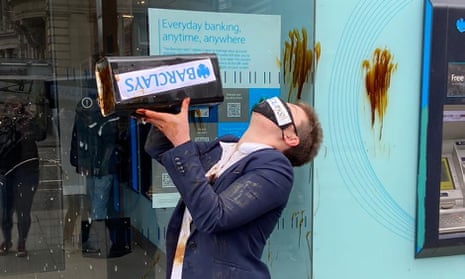Extinction Rebellion is planning to step up its campaign against the banking system with a series of direct action protests and debt strikes in the coming weeks aimed at highlighting the financial sector’s role in the escalating climate crisis.
Last week the group targeted Barclays Bank’s headquarters in London and the Bank of England as well as high street branches across the UK as part of its Money Rebellion protest.
One of XR’s founders, Gail Bradbrook, broke the windows of the Barclays branch in her home town of Stroud to kickstart the campaign.
“This is an escalation in tactics,” she said. “As the suffragettes said, better broken windows than broken promises. What do we need to do to shake the system, to change the system that is killing us … I literally do not know what else to do.”
A recent report found that the world’s 60 biggest banks have provided $3.8tn (£2.75tn) of financing for fossil fuel companies since the Paris climate deal in 2015, and that Barclays provided the most among all European banks.
XR said more direct action protests were planned for this week as part of a campaign that will also involve debt, tax and mortgage strikes. One group of activists have taken out loans totalling £4,000 from Barclays that they are refusing to repay and have instead donated the money to the human rights group Survival International.
Later this month XR is planning to launch a tax strike during which campaigners will withhold a percentage of theirs – about 3.5% from business or income tax.
The money, which the group has calculated is the percentage the government spends on “harming the planet”, will be withheld for a year, and if by that time ministers have not met the group’s demands – including telling the truth about the climate emergency and cancelling “destructive projects” – the money will be donated to Wilderlands, a project to support nature in the UK.
Bradbrook said it was time to “challenge a system that has destruction baked in and incentivises harm”, adding that it was being critiqued not just by protesters but by the “World Economic Forum, the Economist magazine, IMF … Prince Charles”.
She continued: “It is no longer seen as radical and ridiculous to say the political economy needs to dramatically change. It has become a mainstream conversation … I think anyone saying we have to have what we’ve got because there are no better ideas has either got their eyes closed or they are just pushing the agenda of business as usual because themselves or their paymasters are making too much money.”
XR, which came to prominence in April 2019 when thousands of people blocked sites across London for days, said it was finalising plans for action in the buildup to Cop26, the international climate meeting being held in Glasgow in November.
“XR’s job is to keep the pressure up on the climate and ecological crisis and the inter-related justice issues and we will carry on doing that,” said Bradbrook. “There are many rebels that want to see Cop do as well as it can, so creating the pressure on the streets can help.”
But she said the “Cop process” had so far failed to bring about the changes that were required to address the huge challenge of the climate and ecological emergency. “We need to look at the systemic issues around why we are failing to act and why we are carrying on killing our life support system,” she said.
In response to Barclays being targeted by XR, a spokesperson for the bank said: “We have made a commitment to align our entire financing portfolio to the goals of the Paris agreement, with specific targets and transparent reporting, on the way to achieving our ambition to be a net zero bank by 2050 and help accelerate the transition to a low-carbon economy.”
